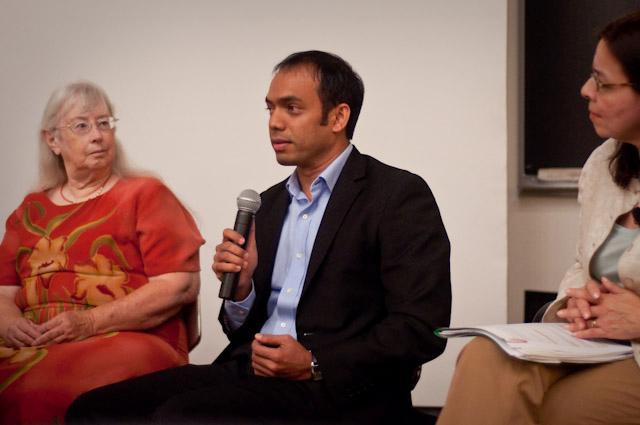
Rais Bhuiyan speaks at the “Ending the Cylces of Violence” lecture, on Friday evening. Bhuiyan, the founder of WorldWithoutHate.org, was one of the nation’s first hate crime victims after 9/11. (Karissa Jobman/The Daily Campus)
Sept. 11, 2001 is a day that will live on in infamy. The anger, violence and fear that day created continue to seep through the fabric of American life.
As the 10th anniversary of 9/11 approached, the Cary M. Maguire Center for Ethics and Public Responsibility held a series of events reflecting on the anniversary and what it means today.
On Sept.9, approximately 50 people gathered in Dallas Hall’s McCord Auditorium to listen to a panel of community and interfaith leaders discuss the “violence that began on 9/11 and the need for national and global healing.”
Dallas Morning News senior writer Dianne Solís moderated the nine speakers as they examined the steps to take in order to create a world full of non-violence, one where compassion, not hate, is the primary emotion.
The panel included Rais Bhuiyan, a Muslim man from Bangladesh, who survived a facial bullet wound by Mark Stroman, an enraged man seeking retaliation for 9/11.
Stroman had previously murdered two South Asian men in Dallas within a month of the attacks and was eventually arrested and sentenced to death.
Instead of responding with retribution, Bhuiyan sued to stop the execution, and even created a website called “World Without Hate” to help spread his message. Bhuiyan, however, was unsuccessful and Stroman was executed in July.
“My parents teaching, upbringing and Islamic faith helped me to forgive and never hate, and run this campaign because he is a human being,” Bhuiyan said.
Most of the panel agreed that while America has come a long way in eradicating intolerance, the journey to acceptance is far from over. Alia Salem, founder of the DFW Chapter of the Islamic Speaker’s Bureau, felt there was a serendipitous level of kindness directed toward her in the early days following 9/11, but has since witnessed a weakening in tolerance for Islam.
“[There has been] a decline in how I feel, as far as my comfort level, in engaging with people…the people who defended mosques after 9/11 are the same people who protest new mosques being built,” she said.
The anger in today’s society was put down to a lack of understanding, fear and ignorance. Panelists agreed that cultural education and instruction on how to deal with negative emotions were key in creating a more compassionate world.
“Each of us thinks we have a special monopoly on the creator…we refuse to realize that the creator intentionally made us different,” Hind Jarrah, co-founder and former president of Texas Muslim Women’s Foundation, said.
Attendee Lauren Zielinski thought it was interesting to hear from all the different faiths and see the many commonalities between them.
“I feel like this is a conversation that many people would benefit from hearing,” she said.
SMU student Amar Zeynu said that while he felt ostracized in high school for being different, his experience at SMU has been a positive one.
“The Chaplin’s Office has been really supportive of the Muslim Student Association and has made us feel like we’re not a minority at all,” he said.
The event concluded with a video of Robert Kennedy’s April 1968 speech on the menace of violence where he asserted that “violence breeds violence, repression breeds retaliation, and only a cleansing of our whole society can remove this sickness from our souls.”








